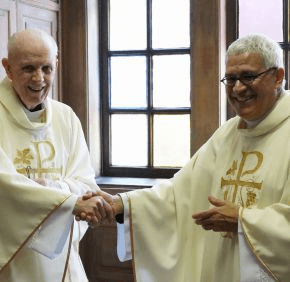By Erik Zygmont
ezygmont@CatholicReview.org
Twitter @ReviewErik
“If I’m going to stay here, why not open a school?” Jesuit Father William Watters asked himself.
It was 1991 and he was in Baltimore, though his heart remained in Nigeria, where he had served a parish of 15,000 and opened a feeding and shelter ministry just outside of the parish compound.
The first time he celebrated Mass at St. Joseph Catholic Church in Benin City, 2,000 Nigerians participated. At Father Watters’ first two Masses as pastor of St. Ignatius in Baltimore, in September 1991, a total of 167 parishioners came.
“I said, ‘What am I doing here?’ ” he remembered. “Ever after, the Lord answered what I’m doing here.”
Now 81, Father Watters is stepping down after his second run as pastor of St. Ignatius in Baltimore. Through his 63-year ministry as a Jesuit, 50 as a priest, he has fostered – without direct compensation – several start-ups, including schools, social outreach ministries and cultural endeavors, including a free lecture series.
St. Ignatius Loyola Academy, which opened its doors in 1993 and continues to serve modest-income boys in grades six through eight, stands out.
Despite the initial low numbers at his parish – Father Watters had been sent to St. Ignatius to help his provincial decide whether or not to close the church, he said – he identified a need for an associated middle school to serve city youths.
His thought process fed by a steady-stream of newspaper articles bemoaning a lack of quality secondary and middle school education in the city, he remembered the Nativity Mission Center School in New York City. The Jesuit institution had opened in the early 1970s, serving the children of low-income families of the Lower East Side.
Father Watters reminded his parishioners at St. Ignatius, located at 740 N. Calvert St., that the spot had ties to education even before worship. The Jesuits had chosen it as a location for Loyola College, now Loyola University Maryland.
The parishioners thought an all-scholarship school educating underserved boys was “a great idea,” so Father Watters and others conducted a nine-month feasibility study, and he presented the results to his provincial.
“He said, ‘Go for it,’” Father Watters remembered, adding that the Maryland Province Jesuits committed $150,000 in the form of three annual $50,000 grants, to get St. Ignatius Loyola Academy started.
In 1992, he got a phone call from Robert Embry, president of the Abell Foundation, and the two met on New Year’s Eve.
“He said, ‘Tell me about this school,’” Father Watters recounted.
After the priest told him about the rigorous, all-day curriculum, Embry matched the Jesuits’ financial commitment of $150,000 for three years.
“I was floored,” Father Watters said. “God is good.”
A board of business leaders was formed. Their connections led to more funding for the school, as businesspeople met and were impressed by the students.
“What can I do to help?” was a frequently asked question.
The direct answer: Sponsor a student for three years, a total of $15,000.
“A man would invariably say either ‘I’ll do it’ or ‘I’m going to go home and talk to my wife,’ ” Father Watters remembered.
Sponsorships poured in, rendering the Jesuit and Abell Foundation programs “money in the bank” that could be used for building improvements and special programs. By 1996 St. Ignatius Loyola offered endowed scholarships. Today, the school, which has since moved to South Baltimore, educates 83 students, Father Watters said, and plans to add a fifth-grade in 2016.
Father Watters served as president of the school until 2004, when he immediately threw himself into a new venture: “We’ve got a middle school; now we need a high school.”
By 2007, Cristo Rey Jesuit High School, also serving students at economic disadvantage, was up and running. Every graduate has been accepted into college. Like St. Ignatius Loyola, most of its students are black.
Father Watters is also involved in an effort – to be continued by his successor at St. Ignatius, Jesuit Father James Casciotti, who has asked him to continue to minister at the parish – to establish a rapport with Sandtown, the neighborhood where Freddie Gray lived, and the neighborhood hit hardest in the unrest after his death.
“We owe that to that community more than anybody else,” Father Watters said, acknowledging that the Jesuits once owned slaves in Maryland, “a terrible sin.”
“One of the ways we ask for God’s forgiveness is by working for our black brothers and sisters,” he said.
Spreading the Gospel through action has been a mark of Father Watters’ ministry. St. Ignatius, which has grown to include 875 families, has a “very strong” justice and peace committee, he said, with sub-committees dealing with immigration, racial equality and “bread for the world.”
The church’s Loaves and Fishes Ministry makes 16 stops every Sunday night, distributing sandwiches, fruit, soup, candy, water, scarves, hats, shoes and other essentials to those in need.
The parish supports outreach and ministry efforts at home – Our Daily Bread, Viva House, My Sister’s Place, the Franciscan Center – and abroad. When a Nigerian priest who had been an altar boy for Father Watters was establishing a new parish, St. Ignatius parishioners raised $14,000 to help build a well, church and school.
“Rather than curse the dark, light a candle,” Father Watters said.
Also see:
Fresh start: St. Ignatius Loyola Academy moves to new location


